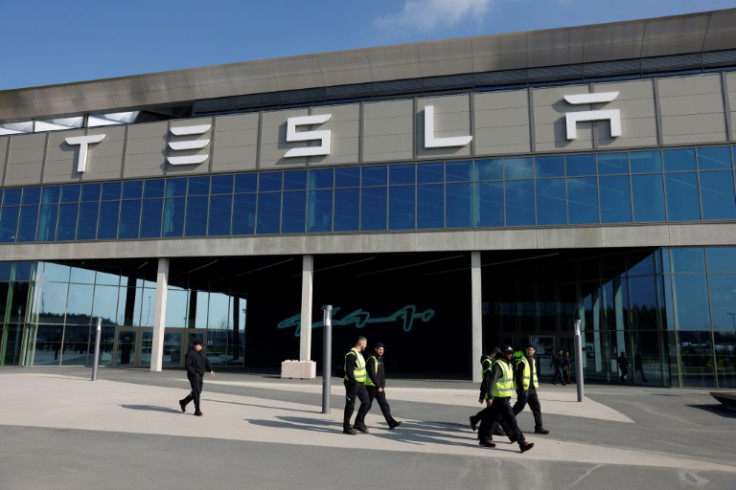Tesla Reports Drop In Auto Sales, While Toyota Sees US Surge

Tesla reported sharply lower first-quarter auto sales on Tuesday amid an underwhelming demand outlook for electric vehicles, while legacy players including Toyota rode improved US inventories to higher sales.
Elon Musk's auto giant reported 386,810 global deliveries over the period, down 8.5 percent, reflecting in part a weak sales market in China, where it faces heavy competition from local electric vehicle (EV) makers.
Tesla also cited the drag from an apparent arson attack on power lines in Germany that dented output at the company's lone European factory.
Among other automakers, General Motors reported a slight dip in sales -- while Toyota enjoyed a surge compared with a year-ago period, when it was constrained by severe inventory issues due to Covid-19 supply chain problems.
Analysts have been expecting about a six percent rise in overall sales in the quarter, reflecting a still strong labor market and an improved supply picture that has eased pricing pressures.
However, market watchers caution that many consumers still feel the pinch from higher interest rates.
In explaining the drop, Tesla pointed to a hit from the production ramp-up of an updated Model 3 at its California factory and factory shutdowns due to shipping diversions caused by the Red Sea conflict, as well as the attack on Gigafactory Berlin.
Morningstar said the decline also "points to a slowdown in demand for Tesla's vehicles, as the company's competitors, particularly in China, may have cut prices more than Tesla to win consumers."
Analysts have been girding for a tough first quarter for the high-flying Tesla, which has reportedly cut production in China the face of the rise of BYD and other Chinese automakers.
At the same time, an increase in EVs in other markets including the United States has led Tesla to enact price cuts, dimming the company's profit outlook.
"While we were anticipating a bad 1Q, this was an unmitigated disaster," said Wedbush analyst Dan Ives.
"We view this as a seminal moment in the Tesla story for Musk to either turn this around and reverse the black eye 1Q performance. Otherwise, some darker days could clearly be ahead that could disrupt the long-term Tesla narrative."
Elsewhere, GM reported a 1.5 percent dip in first-quarter US deliveries, a slightly bigger decline than the 0.7 percent projected by Edmunds.com.
But the US giant pointed to continued strong customer demand for its vehicles, with its incentives trending below the industry average.
While overall EV sales fell compared with the year-ago period, GM described its ramp-up as "on track," with deliveries of its Equinox EV beginning to ship to dealers in the first half of 2024.
Targeted at middle- and working-class consumers, the Equinox is being closely watched as a barometer of mainstream US demand for EVs.
The first available versions of the model will start at $43,295, with the lowest priced option around $35,000 available later in 2024, according to Chevy. The average EV was priced at $52,314 in February, according to Kelley Blue Book.
The Equinox will qualify for a federal $7,500 US tax credit, knocking that price off the vehicle.
At Toyota, US auto sales for the quarter jumped 20.3 percent to 565,098. The Japanese automaker scored broad-based gains across its nameplate and Lexus luxury brand, in a dynamic that had been expected by analysts due to the much-improved inventory situation.
Similarly, Honda, which also experienced vehicle shortages in the 2023 period, won a 17.3 percent increase in US quarterly sales to 333,824.
Cox Automotive Chief Economist Jonathan Smoke described the macro environment as "mixed," noting that some potential car consumers may hold off on purchases if they expect the Federal Reserve to cut interest rates later this year.
"It's not bleak, but it's not trending positively for consumer spending to improve in the near term," Smoke said on a conference call last week.
Tesla shares fell 4.6 percent in early-afternoon trading, while GM lost 0.9 percent and Toyota fell 0.9 percent.
© Copyright AFP {{Year}}. All rights reserved.





















